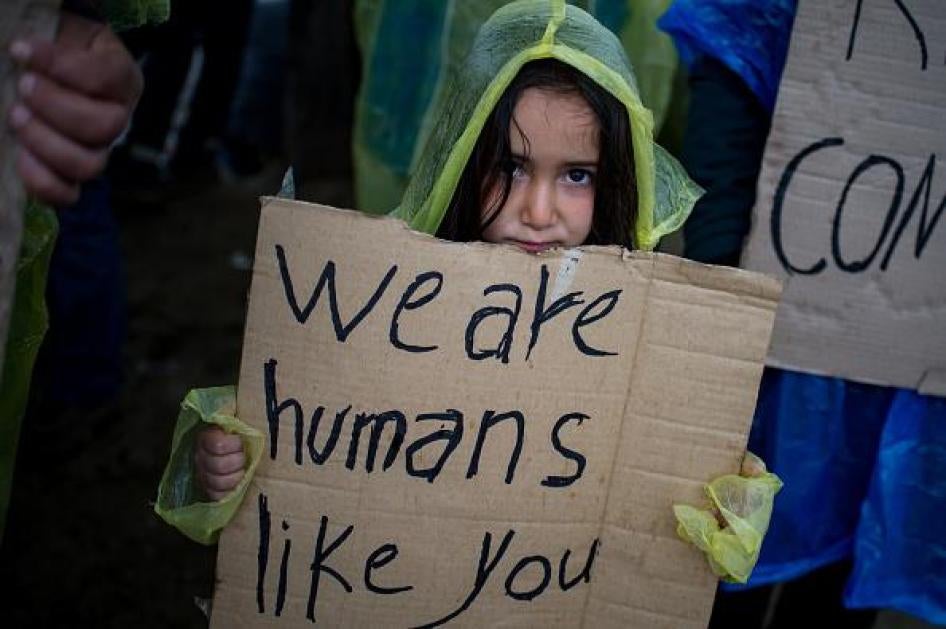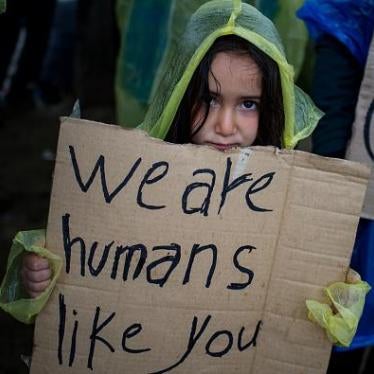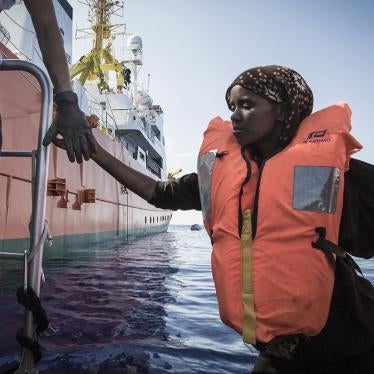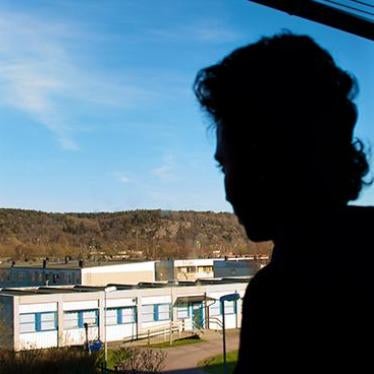(Brussels) – An European Union summit in Brussels starting on June 28, 2018, is likely to be a critical moment for the development of EU migration policy, Human Rights Watch said.
An informal meeting of 16 EU leaders on June 24 suggested that the bloc is deeply divided over the issue. The debate over migration policy is dominating EU politics at a time when arrivals to the EU by sea are at their lowest point since 2013.
“Engineered panic and fearmongering by European politicians over migration is steering the EU toward very dangerous waters,” said Judith Sunderland, associate Europe and Central Asia director at Human Rights Watch. “EU leaders should be guided by the compass of rights and firmly reject offshore processing; which Australia has shown to be a recipe for abuse and despair.”
Draft conclusions for the June 28-29 Summit meeting endorse the concept of “regional disembarkation platforms.” Such an approach could refer to helpful arrangements to clarify and share responsibility for rescued migrants, asylum seekers, and refugees across EU states and possibly with states outside the EU that have the capacity to provide protection. That could help address disputes that have left rescued people stranded on boats for days. But the concept could also be interpreted to refer to the deeply problematic idea, advocated by some EU states, of processing of asylum seekers in closed centers outside EU territory.
According to the UN Refugee Agency, the number of people displaced by conflict and persecution totalled a record high 68.5 million in 2017, including 25.4 million refugees who crossed international borders in search of protection. Meanwhile in Europe the numbers of new arrivals are down. Total arrivals in the Mediterranean are well below half what they were at this time in 2017. Arrivals to Italy, primarily from Libya, are down by 78 percent compared to 2017. They are also far below the numbers of arrivals in 2015, when 1 million, predominately Syrian refugees, arrived during the course of the year.
Despite this dramatic reduction, the influence of xenophobic populist EU leaders and deep divisions among EU states on sharing responsibility have resulted in increasingly draconian measures being put forward to prevent arrivals. Such measures would seek to deflect responsibility onto countries outside the EU with less capacity to process claims and protect refugees.
Efforts to address imbalances and inequities among EU member states in terms of responsibility for migrants, including asylum seekers and refugees, appear completely stalled. But the numbers of arrivals are manageable if there is effective cooperation on efficient processing, continued resettlement of refugees, and safe returns of rejected asylum seekers, Human Rights Watch said.
The new League-Five Star Movement coalition government in Italy has essentially sealed its ports to all but Italian Coast Guard and Navy ships. As a result, 630 people were stranded aboard the rescue ship the Aquarius early in June, before Spain stepped in to accept them.
Over 300 people have been stranded at sea for days aboard a rescue ship operated by Mission Lifeline, a German organization, with no EU country willing to let them disembark.
A regional disembarkation agreement, properly crafted and carried out in good faith could help facilitate rescues and save lives, Human Rights Watch said. It could help ensure that all vessels at sea fulfil their duty to respond to situations of distress because there is greater certainty and predictability around their ability to land swiftly in a place of safety. This is critical to preserve life-saving efforts in the Central Mediterranean, including by nongovernmental rescue groups as well as merchant vessels, and to avoid recurring disputes about disembarkation of rescued migrants and asylum seekers.
“EU leaders should stop using women, men, and children on rescue boats as political pawns” Sunderland said. “Refusing to let rescued people land, ignoring both basic decency and international norms, could discourage rescue at sea and put lives at risk.”
But EU leaders should categorically reject the discredited proposal, given new life in recent policy circles, of setting up facilities to process migrants and asylum seekers in non-EU countries that don’t meet EU standards, Human Rights Watch said. Offshore processing by the United States and Australia demonstrates the risk that asylum seekers and recognized refugees would get stuck in protracted limbo in isolated, dismal holding centers. Whether in continental Europe, North Africa, or elsewhere, any processing center should meet European standards, including for procedural rights and reception conditions.
The suggestion that United Nations agencies such as the UN refugee agency UNHCR and the International Organization for Migration (IOM) would operate these centers does not answer fundamental questions about the fairness of procedures. These questions include whether people would have freedom of movement, whether the conditions and duration of stay – and potentially, detention – would comply with international standards, and whether the rights of both those recognized as refugees and those whose asylum claims are rejected would be observed. Human Rights Watch is opposed to any system that would involve automatic detention of asylum seekers, unaccompanied children, and families with children.
A regional disembarkation agreement among EU countries could include provisions to swiftly relocate people to another EU country that assumes responsibility for legal processing, Human Rights Watch said. If such arrangements include disembarkation in a non-EU country of people rescued by European-flagged vessels or during operations coordinated or facilitated by EU states, key conditions should be met, Human Rights Watch said. These conditions include, at a minimum:
- Prior independent verification of fair and humane treatment for all migrants and willingness to admit the people in question;
- Procedural guarantees around detention, including limits on the duration of administrative detention and requirements to meet UN guidelines on detention conditions, including consideration of alternatives to detention;
- Procedural guarantees against refoulement – that is, returning anyone to a place where they face a real risk of persecution, torture, or other ill-treatment – and chain refoulement – that is, the risk that the country that accepts them would then return them to another country where they would face such treatment;
- Access to a fair and efficient asylum procedure with the chance to be recognized as a refugee in line with the 1951 Refugee Convention; and
- Provision for a lawful stay with freedom of movement and work authorization, or for offers of quick resettlement options, with access to durable solutions, for people recognized as refugees.
“The divisive political debate in Europe today should not obscure the fact that with genuine leadership a principled approach could uphold human rights and manage migration,” Sunderland said. “At the summit, EU leaders should show they are prepared to share responsibility, protect refugees, and treat people fairly and humanely, while securing borders.”









